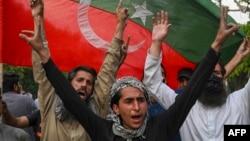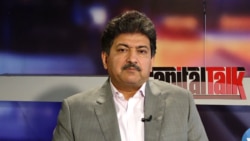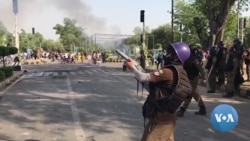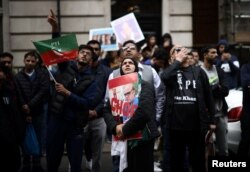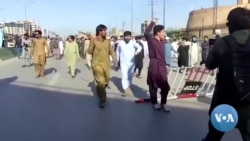Pakistan's Supreme Court on Thursday ordered the release of the country's popular former Prime Minister Imran Khan, whose dramatic arrest and detention have sparked nationwide violent protests.
The 70-year-old former cricket star was dragged outside and shoved into an armored vehicle by paramilitary troops Tuesday as he waited to attend a court hearing in the capital, Islamabad.
Khan's supporters danced outside the Supreme Court to celebrate the release order. The ruling directed Khanto appear Friday before the federal high court from where he was "unlawfully" arrested.
Until then, Chief Justice Ata Bandial directed authorities to keep Khan at a police guesthouse in the capital and give him free access to close family members and legal advisors.
Bandial also asked Khan to issue an appeal to supporters of his Pakistan Tehreek-e-Insaf, or PTI party, to remain peaceful.
Earlier Thursday, police and PTI officials confirmed that most of the central leadership of the country's largest political party and more than 2,000 Khan supporters had been arrested or are being hunted on charges of criminal intimidation, rioting and assault on state property.
The clampdown responded to swift, massive, and violent nationwide protests sparked by Khan's arrest on Tuesday. Clashes between protesters, including men and women, and riot police have since killed at least eight people and injured scores of others.
Human Rights Watch said Thursday that Pakistan police "fired on and used excessive force" against protesters.
Prime Minister Shehbaz Sharif's coalition government called in troops overnight to help police restore law and order in the hardest-hit areas, including Islamabad and the two provinces of Punjab, Pakistan's most populous, and Khyber Pakhtunkhwa.
There was almost a complete media blackout of the PTI-led protests on dozens of local news channels. Access to mobile internet services and social media platforms, such as Twitter, Facebook, and YouTube, continued to be restricted nationwide for a third day Thursday.
"The government's cutting off mobile internet services, and restrictions on access to Twitter, Facebook, and other social media platforms, is overbroad and indiscriminate in violation of basic rights," Human Rights Watch said in its statement.
SEE ALSO: Journalist Hamid Mir on the challenges reporters face in Pakistan
Sporadic clashes occurred in parts of Islamabad Thursday, with main highways leading into the city closed by police. Authorities in Lahore, the capital of Punjab, had locked down most of the city, according to residents and police.
Khan has faced dozens of charges, ranging from alleged terrorism and corruption to treason and other criminal offenses. He rejects all the charges as frivolous and politically motivated.
On Wednesday, a special anti-graft court remanded Khan in custody for eight days while another indicted him on separate corruption charges. The tribunals were established inside the high-security police headquarters in Islamabad.
During the hearing, defense attorneys said that the former prime minister told judges that security forces had physically assaulted him before arresting him and dragging him from the court building.
Protesters, including men and women, directed their rage mainly at the powerful military that the former prime minister persistently accused of orchestrating his ouster from office last year and later instituting "baseless and frivolous" court cases against him.
On Tuesday, Khan supporters gathered outside the military headquarters in Rawalpindi, adjacent to Islamabad, and other army installations in Pakistan, chanting slogans against the powerful institution, something that has not been seen in the recent history of the country of about 230 million people.
The military's media wing Wednesday, in a strongly worded statement, said that attacks on its installations and sloganeering against the institution were "pre-planned" and part of an organized effort. The Inter-Services Public Relations condemned the PTI leadership and supporters as "miscreants,” warning of stern action against them.
"Any further attacks on the army, including all law enforcement agencies, military and state installations, and properties, will trigger a severe retaliation against this (PTI) group that wants to push Pakistan into a civil war," the statement said.
In stunning remarks, former American diplomat Zalmay Khalilzad tweeted Thursday that there "is growing fear that Imran Khan might be killed/assassinated while in custody." He called on authorities to release the former prime minister and to ensure his security.
"Murdering Imran Khan will make things a lot worse in the country. In addition, Pakistan will face international condemnation, isolation, and even sanctions," warned Khalilzad, who has frequently commented on the lingering political turmoil in recent weeks.
The United States, while responding to Khan's arrest Tuesday, called for making "sure that whatever happens in Pakistan is consistent with the rule of law, with the constitution."
United Nations Secretary-General Antonio Guterres called for all parties to refrain from violence and stressed respecting the right to peaceful assembly.
"The secretary-general urges the authorities to respect due process and the rule of law in proceedings brought against former Prime Minister Khan," said Farhan Haq, a spokesman for the U.N. chief.
SEE ALSO: A related video by VOA Pakistan Bureau Chief Sarah Zaman
While the Sharif government defended Khan's arrest as in line with the law, critics questioned those assertions.
"We deplore the use of disproportionate force in arresting Mr. Khan from the premises of the Islamabad High Court. It was clearly unwarranted and has only aggravated the political climate,” the independent Human Rights Commission of Pakistan in a statement late Wednesday.
The watchdog condemned the violence "perpetrated both by security and law enforcement personnel” and said it was "greatly troubled" by the unfolding political crisis in the country
"Now that the state has Imran Khan in custody, does it have a plan for what comes next? The PTI's vast support base — a majority of the citizenry, if recent polls are to be believed — is seething with rage," wrote the prestigious English daily Dawn in its editorial Thursday.
"There is little that is democratic about the manner in which they [the government] have chosen to act, and they may one day pay a heavy price for their complicity today," the newspaper said, suggesting the crackdown on PTI is a whole of state response.
Khan was removed from office in a parliamentary no-confidence vote in April of last year, a move he rejected as illegal and planned by the now-retired chief of the Pakistani military, General Qamar Javed Bajwa.
The Pakistani military has a long history of direct and indirect political intervention, with political parties and independent analysts blaming the institution for the fragility of the country's democracy.
Army generals have staged several coups and arrested politically popular prime ministers on trumped-up treason and other charges, ruling the country for nearly half its 75 years.
Khan's arrest came just hours after he added new details to his allegation that a senior general within the Pakistani military spy agency, the Inter-Services Intelligence or ISI, is plotting to kill him.
He made the claims a day after the military warned him against leveling what it condemned as "fabricated and malicious" allegations.
Khan was injured in an assassination attempt last November while leading an anti-government protest march near Lahore, Punjab’s capital. The attack killed one person, while the PTI chief received bullet wounds in his legs.
SEE ALSO: A related video by VOA Pakistan Bureau Chief Sarah Zaman
Khan accused Major-General Faisal Naseer, ISI’s director general of counterintelligence, of being one of the planners of the assassination attempt, saying the officer continued to plot his killing.
Government officials have said that the November assassination attempt was the work of a lone gunman, who is now in custody and confessed in a video controversially leaked to the media.




